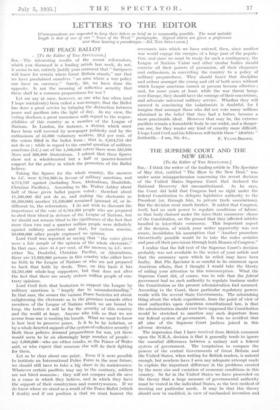LETTERS TO THE EDITOR
[Correspondents are requested to keep their letters as brief as is reasonably possible. The most suitable length is that of one of our " News of the Week" paragraphs. Signed tellers are given a preference. over those bearing a pseudonym.—Ed. THE SPECTATOR.]
THE PEACE BALLOT
. [To the Editor of Tim SPECTATOR.]
Sin,—The interesting results of the recent referendum, which you discussed in a leading article last week, do not, it seems to me, entirely justify your comment that " foreigners will know for certain where Great Britain stands," nor that we have proclaimed ourselves " an area where a war policy can have no currency." Surely, Sir, we have done the opposite. Is not the meaning of collective security that there shall be a common preparedness for war ?
Let me say at once, however, as one who has often (and
I hope mistakenly) been called a war-monger, that the Ballot has done a great service by bringing the distinction between peace and pacifism into the light of day. In my view, the voting discloses a great uneasiness with regard to the respon- sibilities of this country as a member of the League of Nations. In London, for instance, 'a district which must have been well covered by newspaper publicity and by the enthusiasm of 35,000 voluntary workers; 29.3 per cent. of the voters filled in the ballot form : that is, 3,814,753 did not do so ; while in regard to the crucial question of military sanctions (5.C.) out of the 1,580,848 voters there were 385,886 Noes and 308,969 Abstentions. I submit that these figures show not a wholehearted but a half or quarter-hearted support for the policy in which the promoters of the Ballot believe.
Taking the figures for the whole country, the answers to 5.C. were 6,784,368.in favour of military sanctions, and 4,774,797 against (including Noes, Abstentions, Doubtfuls, Christian Pacifists). According to Mr. Walter Ashley about half of those given ballot papers voted : therefore about 11,500,000 did not do so, and (taking the electorate as 38,500,000) another 15,500,000 remained ignorant of, or in- different to, the referendum. I do not wish to discount the importance of the vote of 6,784,868 people who are prepared to shed their blood in defence of the League of Nations, but we should not remain blind to the significance of the fact that more than two and a quarter million people were definitely against military sanctions and that, for various reasons, 29,000,000 other people expressed no opinion, Lord Cecil was reported as saying that " the votes given were a fair sample of the opinion of the whole electorate." In that case, since 41.4 per cent. of the answers to 5.C. were either No, Doubtful, Christian Pacifist, or Abstentions, there are 15,989,000 persons in this country wbo either have no faith in the League of Nations or who are not prepared to back that faith by deeds. True, on this basin it has 22,561,000 whole-hog supporters, but that does not alter the fact that there arc nearly sixteen million people of con- trary opinions.
Lord Cecil feels that hesitation to support the League by military sanctions is " largely due to misunderstanding." In that case, the sooner the various Peace Societies set about enlightening the electorate as to the promises towards other members of the League of Nations which we are bound to keep, the better it will be for the security of this country and the world at large. Anyone who tells us that we are averse from war is wasting his breath. What we want to know is how best to preserve peace. Is it to be by isolation, or by a whole-hearted support of the system of collective security ? Both these policies demand preparedness for war, yet there would seem to be an alarmingly large number of people—. say 5,000,600—who are either cranks, as the Prince of Wales said, or who expect that someone else will do their fighting for them.
Let us be clear about one point. Even if it were possible to institute an International Police Force in the near future, we should still have to take a big share in its maintenance. Whatever certain pacifists may say to the contrary, soldiers are not hired assassins : they will not conquer and die save in a cause in which they believe, and in which they have the support of their countrymen and countrywomen. If we do know where we stand as a result of the Peace Ballot (which I doubt) and if our position is that we must honour the
covenants into which we have entered; then, since another war would engage the energies of a large part of the popula- tion, and since we must be ready for such a contingency, the League of Nation's Union' and other' similar bOdies should exercise all their powers of persuasion, all their eloquence and enthusiasm, in converting the country to a policy of military preparedness. They should foster that discipline and ardour amongst the young and old of both sexes without which League sanctions cannot at present become effective ; and, for some years at least, while the war threat hangs over Europe, they should have the courage of their convictions, and advocate universal military service. Whether they will succeed in convincing the isolationists is doubtful, for I imagine that amongst those who did not vote many millions abstained in the belief that they had a better, because a more practicable ideal. However that may be, the extreme pacifists remain a formidable body in our midst, and a danger- ous one, for they render any kind of security more difficult. I hope Lord Cecil and his followers will tackle these " idealists "














































 Previous page
Previous page